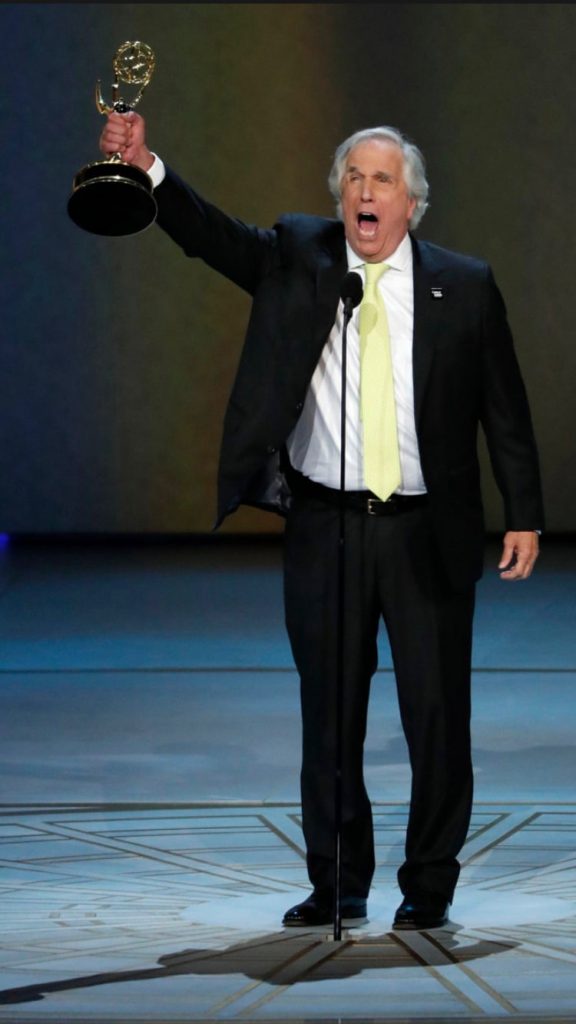What Do People Do With Their Awards After Winning Them?

By David Ertischek ’01
Where do you stash your Tony after you win? Do Pulitzers need warning labels? And what happens to awards after the recipient passes?
The 71st Annual Primetime Emmy Awards are upon us this weekend, and with several Emersonians are nominated to bring home a little atom-grabbing lady with wings, we asked some award-winning Emersonians what they did with their statuettes.
Related: Emersonians Celebrate Nominations and Creative Arts Emmy Wins
As the Fonz on Happy Days, Henry Winkler ’67 won two Golden Globes for Best Actor in a comedy series. This year, Winkler is nominated for Outstanding Supporting Actor in a Comedy Series for his work as acting teacher Gene Cousineau in HBO’s Barry, a role that won him his first Primetime Emmy last year. (Winkler also has two Daytime Emmy Awards.)
“The awards that I have been fortunate enough to win — that I have been honored to win — are all over the house,” said Winkler. “The Emmy for Barry however, is right in the middle of the dining room table, which is opposite the front door.”

Writing, Literature & Publishing Professor Megan Marshall has to be careful of her 2014 Pulitzer Prize in Biography and Memoir, which she won for her book Margaret Fuller: A New American Life.
“Each year, Tiffany designs this kind of glass thing, that in my case looks like you’d think is a paperweight, but … it is not supposed to be a paperweight,” said Marshall. “[The Pulitzer Prize] has [Joseph Pulitzer’s] name and a profile of Pulitzer himself, the date and what the prize is for. It’s kind of a beautiful thing and too delicate to be used as a paperweight. Mine is sharply angled, so it’s dangerous.”
Marshall, who is on leave for a five-week residency in Italy, said she keeps her Pulitzer in two locations. Usually it’s on a little stand atop an antique desk, but she moves it to the piano in her living room when people are going to be near its normal spot.

Sometimes, you have to wait a while to gain possession of your award after winning.
Unlike the Oscars, which are engraved and go home with the winners that night, Tony Awards are returned so they can be engraved with the winner’s name. It takes about eight weeks for the awards to end up in the winners’ hands.
“On the night of the Tony Awards, all the individual category winners are presented with a statuette,” said Eric Cornell ’05, whose Cornice Productions won a 2019 Tony for Best Revival of a Musical for Rodgers & Hammerstein’s Oklahoma!. “But there is just one or two Tonys presented to a winning show that the lead producers get to bring to the parties, celebrate the night, and let co-producers all have a moment with it.”
Cornell said he planned on keeping the award on a bookshelf in his living room, along with his nomination pin and some other theatre memorabilia. “I imagine it will live there and not travel much,” he said.

Occasionally, awards move across the country.
Take the 1986 Emmy for Outstanding Supporting Actor in a Drama Series, won by Emerson College alumnus Richard Dysart ’56 for his role as senior partner Leland McKenzie on L.A. Law.
Dysart, who died in 2015, donated his award to the Emerson College Archives, and that is where it lives today.
Categories